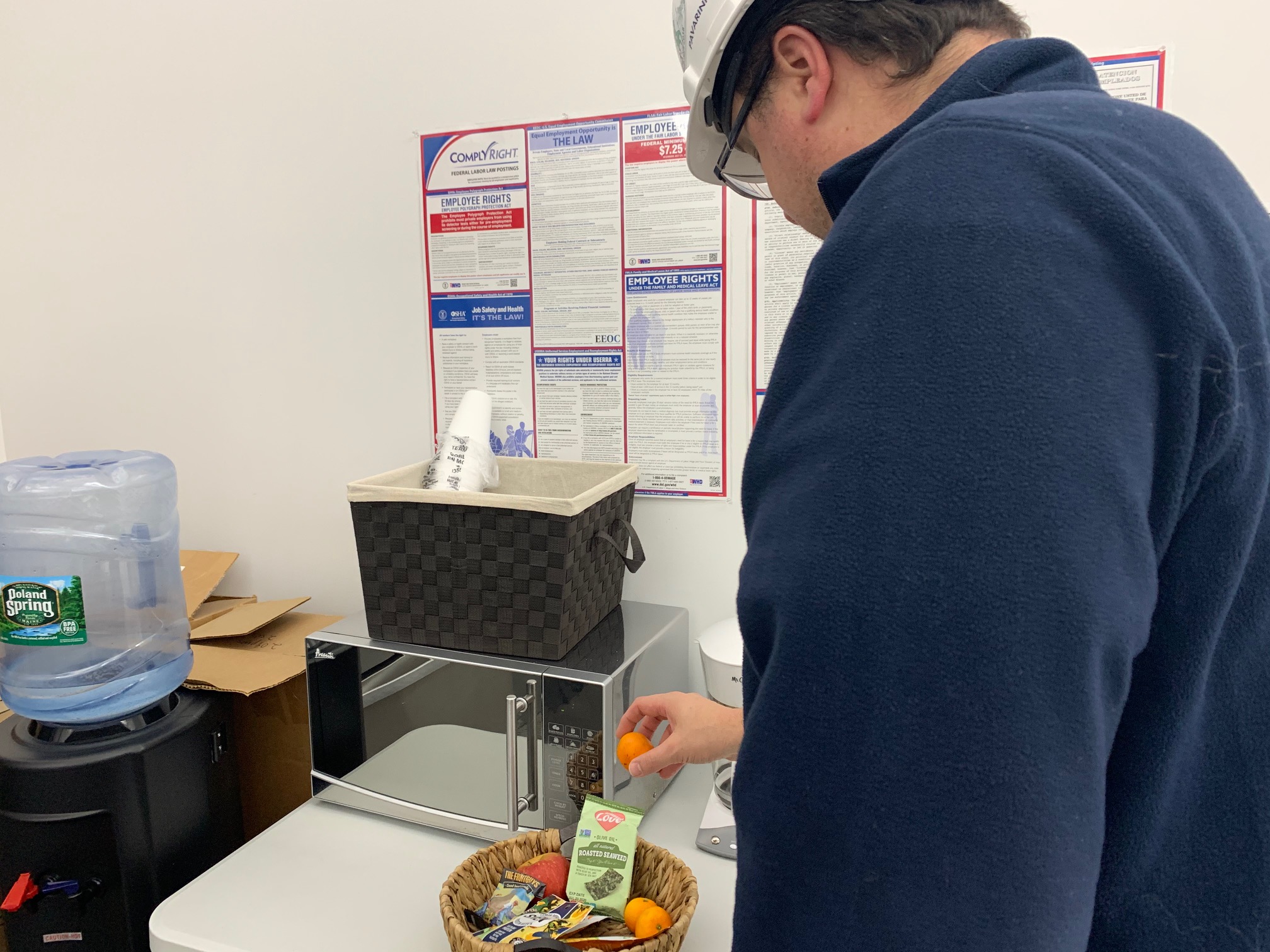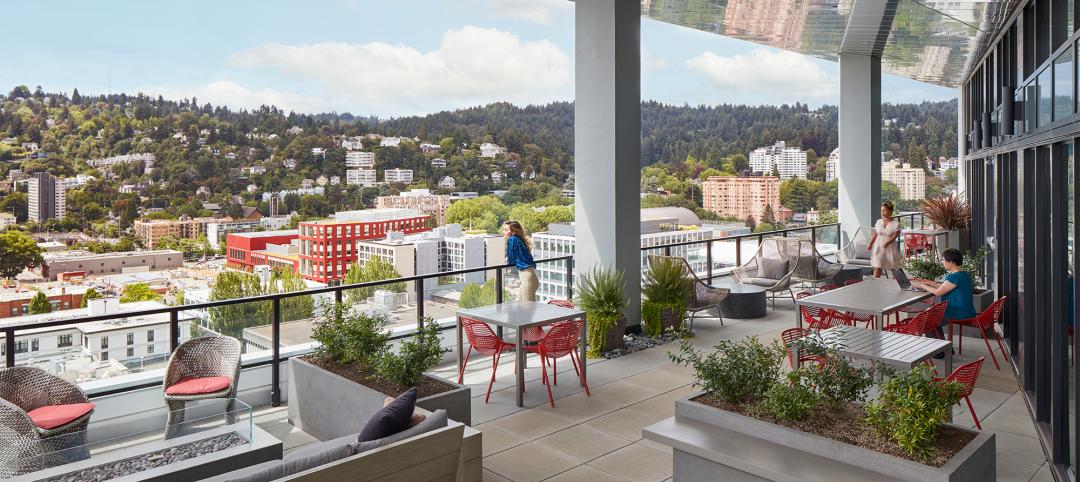Construction work is demanding—both physically and mentally—and the likelihood of injury or disability is higher than other sectors. As an industry, we have done an excellent job at emphasizing and improving site safety so that everyone goes home safe every day. But what about going home healthy?
While formal regulations, planning, and union collective bargaining agreements have helped address many health and safety risks, more holistic health and wellness issues, such as dehydration, weight management, poor air quality, and stress, are less commonly addressed.
New research on wellness in the construction sector highlights interventions that could be effective in addressing these issues.
1. Hydration stations. Dehydration can cause cognitive impairment and acute illness, and is linked with long-term health consequences like kidney stones and bladder cancer. Convenient, visible access to water is often considered the first step in addressing worker dehydration. In fact, many municipal and state laws require construction companies to supply water on their jobsites. Structure Tone’s Boston office not only supplies water to its jobsites, but goes one step further by delivering it from a hard-plumbed water source, which reduces the chance for contamination associated with a standard, five-gallon jug water dispenser system.
2. Access to healthy food. The prevalence of overweight employees within the construction industry is significantly higher than the general adult population. This has obvious health implications, but also business implications. Obesity can increase the risk of workplace disability, as well as decrease work ability and performance. Leading construction companies are addressing this issue head on. Turner Construction, for example, has implemented “wellness trailers” equipped to not only handle immediate medical responses, but also to help address chronic health issues such as obesity and Type 2 diabetes by providing healthy food and educational resources. Similarly, BCCI Construction recognizes the limitations of food storage on jobsites and has started providing food and beverages that are low in sugar and high in protein.
3. Space and tools for mindfulness. Workplace stress is linked to depression, anxiety, and even suicide. Empirical research on mindfulness in the construction sector supports the proposition that it could be beneficial to workers. Lendlease, for example, has recognized the importance of integrating mental health into its culture. Acknowledging that construction employees are more likely to experience high levels of stress, anxiety, and depression, they introduced Wellbeing Leave in 2015, which gives all employees one day every four months to address any health and wellbeing needs. Almost 70% of Lendlease’s employees used their Wellbeing Leave in 2018.
4. Improved air quality. Many construction companies use air quality monitoring and mitigation efforts such as water trucks, wind break installation, and stockpile coverings to manage air quality. Innovative companies, such as Pepper Construction, are going a step above by also addressing air quality within site trailers. Pepper’s trailers include such features as low-VOC/Greenguard Gold-certified acoustical panels and sheetrock, green cleaning supplies, walk-off mats, and operable windows that can provide fresh air.
Wellness in construction: The WELL Building Standard
Wellness features like these on construction sites aren’t just a minor workplace perk but a competitive advantage. Occupational injuries and illnesses cost the global economy over $1.25 trillion, with a disproportionately high rate of recorded accidents in the construction industry. Physically healthier, more mindful employees may be a key component to addressing this issue.
Luckily, construction organizations don’t have to start from scratch. Many of the wellness features outlined in the WELL Building Standard, such as those relating to the mind, nourishment, water, air, and physical activity, can be implemented outside of the typical corporate office on worksites and within construction trailers. Some forward-thinking construction companies like Structure Tone and BCCI have pursued WELL certification for their corporate offices to navigate and institute the associated behavioral changes before migrating those health and wellness opportunities to the jobsites.
BCCI has recently started surveying employees on jobsites to help identify the key impacts and strategize what wellness features to implement. What’s more, the Sustainability Construction Leaders group—sustainability leaders from national construction firms—and the resources behind the wellness building movement are ready to further help the industry integrate healthy workplace practices for construction workers.
About the Authors
Stephanie Timm, PhD, Senior Director, Delos; Whitney Austin Gray, PhD, Senior Vice President, Delos; Kena David, Director of Sustainability, BCCI Construction; Halie Colbourne, Sustainability Associate, BCCI Construction; Jennifer Taranto, Director of Sustainability, Structure Tone
Related Stories
K-12 Schools | Jan 8, 2024
Video: Learn how DLR Group converted two big-box stores into an early education center
Learn how the North Kansas City (Mo.) School District and DLR Group adapted two big-box stores into a 115,000-sf early education center offering services for children with special needs.
Green | Jan 8, 2024
DOE releases RFI on developing national definition for a Zero Emissions Building
The Department of Energy released a Request for Information (RFI) for feedback from industry, academia, research laboratories, government agencies, and other stakeholders on a draft national definition for a Zero Emissions Building.
Codes and Standards | Jan 8, 2024
Australia to be first country to ban engineered stone countertops
In 2024, Australia will be the first country to ban engineered stone countertops. The ban came after a years-long campaign supported by doctors, trade unions, and workers over concerns that the material was causing increased silicosis cases among workers cutting and handling it.
Roofing | Jan 8, 2024
Researchers devise adaptive roof tile concept that adjusts to ambient temperatures
Scientists at the University of California Santa Barbara published a paper that proposes adaptive roof tile technology that can adjust to ambient temperatures. Using a wax motor, tiles could switch from a heating or cooling state enabling savings on heating and cooling costs.
MFPRO+ Special Reports | Jan 4, 2024
Top 10 trends in multifamily rental housing
Demographic and economic shifts, along with work and lifestyle changes, have made apartment living preferable for a wider range of buyers and renters. These top 10 trends in multifamily housing come from BD+C's 2023 Multifamily Annual Report.
Giants 400 | Jan 2, 2024
Top 80 Hotel Construction Firms for 2023
Suffolk Construction, STO Building Group, PCL Construction Enterprises, AECOM, and Brasfield & Gorrie top BD+C's ranking of the nation's largest hotel and resort general contractors and construction management (CM) firms for 2023, as reported in Building Design+Construction's 2023 Giants 400 Report.
MFPRO+ News | Jan 2, 2024
New York City will slash regulations on housing projects
New York City Mayor Eric Adams is expected to cut red tape to make it easier and less costly to build housing projects in the city. Adams would exempt projects with fewer than 175 units in low-density residential areas and those with fewer than 250 units in commercial, manufacturing, and medium- and high-density residential areas from environmental review.
Contractors | Dec 22, 2023
DBIA releases two free DEI resources for AEC firms
The Design-Build Institute of America (DBIA) has released two new resources offering guidance and provisions on diversity, equity, and inclusion (DEI) on design-build projects.
MFPRO+ News | Dec 22, 2023
Document offers guidance on heat pump deployment for multifamily housing
ICAST (International Center for Appropriate and Sustainable Technology) has released a resource guide to help multifamily owners and managers, policymakers, utilities, energy efficiency program implementers, and others advance the deployment of VHE heat pump HVAC and water heaters in multifamily housing.
Sustainability | Dec 22, 2023
WSP unveils scenario-planning online game
WSP has released a scenario-planning online game to help organizations achieve sustainable development goals while expanding awareness about climate change.

















